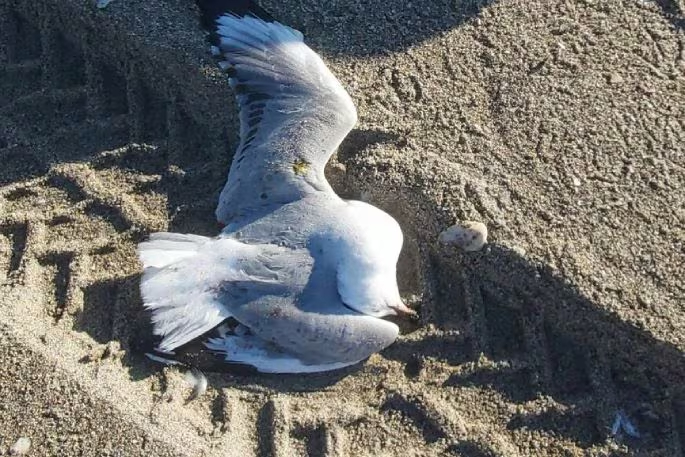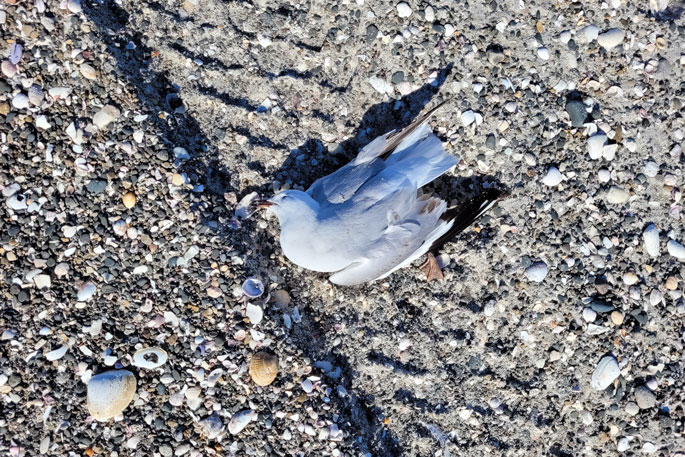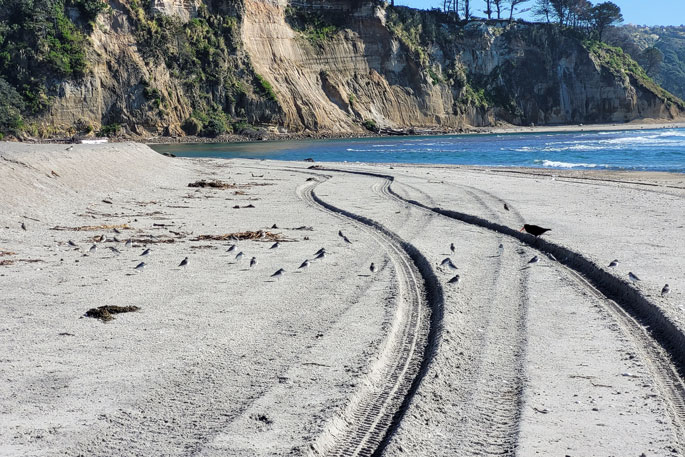DOC staff are appealing for information after 21 protected red-billed gulls were killed by a driver who allegedly drove their vehicle through the birds’ colony on Pukehina Beach late last month.
CCTV footage of the incident, which occurred on July 26, shows a dark coloured four-wheel drive vehicle being driven along the beach at Dotterel Point at about 12.20am.
DOC was made aware of the incident after local farmer Ray Neville spottted the scene when he went for a morning fish.
In a statement released this week, Department of Conservation Principal Investigation Officer Hayden Loper says the carnage was quite confronting for rangers.
The number of gulls killed suggests the birds were either resting or young and naïve enough to have had slow reactions to the threat posed by the driver and their vehicle.
“Red-billed gulls may seem commonplace, but they are listed as ‘at risk – declining’ and are absolutely protected under the Wildlife Act 1953.There is no excuse for this kind of behaviour,” says Hayden.
.jpg) The run-over seagulls cover the Bay of Plenty beach. Photo / Ray Neville.
The run-over seagulls cover the Bay of Plenty beach. Photo / Ray Neville.
Extending from Pukehina Surf Rescue to the mouth of the Waihi estuary, Dotterel Point is a coastal dune providing habitat to many vulnerable species including New Zealand dotterel, variable oystercatchers, gulls, and lizards. Local community group Maketu Ongatoro Wetland Society have been working since 2012 to protect the fragile sandspit ecosystem.
The vehicle driver’s actions cause the gulls to scatter, before the driver and vehicle are seen looping back along the beach, says Hayden.
“The deaths of these protected birds were entirely avoidable, and it’s hit our team quite hard.”
 The run-over seagulls cover the Bay of Plenty beach. Photo / Ray Neville.
The run-over seagulls cover the Bay of Plenty beach. Photo / Ray Neville.
Waikato University associate professor in ecology, biodiversity and animal behaviour, Nick Ling says gulls often roost on land at night,whether in places like headlands or beaches.
“This is quite common, unlike many other seabirds that will roost overnight at sea. In fact gulls can almost be regarded as land birds rather than seabirds as they typically find most of their food on land or close to shore and usually don’t venture very far from shore.
“So, it looks like what has happened in this case is that there was presumably a large group of gulls night roosting on the beach and the vehicle has caught them out.”
Nick says those that weren’t able to get out of the way in time from that much larger group have been run over.
He says why they didn’t react in time in response to the vehicle can only be speculated at – "maybe the car didn’t have its lights on or the sound of the oncoming vehicle was confusing in some way".
“Whatever the reason it highlights the issue with vehicles on beaches and the threats that they pose to wildlife.
“One can sympathise with vehicles that may access the beach for genuine reasons but if it’s just joy riding then that is not acceptable, especially when tragedies such as this occur.”
 A deceased red billed gull in a tyre track at Dotterel Point. Photo: N Lunson/DOC.
A deceased red billed gull in a tyre track at Dotterel Point. Photo: N Lunson/DOC.
DOC says the actions of the driver also violate Western Bay of Plenty District Council bylaws for appropriate vehicle beach access.
Hayden says it is believed the offending driver was behind the wheel of a dark coloured Toyota Hilux or similar vehicle, with a distinctive bull bar, and the driver may be a local resident.
“It seems they may have left through one of the smaller beach access points, indicating the driver is very familiar with the area.”
Although the footage has the driver and vehicle on the beach for approximately four minutes, covering 500m, tracks further down the beach had disappeared with the tide; so the exact exit location is unknown.
Killing absolutely protected wildlife carries a maximum penalty of up to two years’ imprisonment or a fine of up to $100,000, or both. See Western Bay of Plenty District Council Bylaws for more information about council bylaws.
Anyone with further information regarding this incident should please call 0800 DOC HOT (0800 362 468) or email Investigations@doc.govt.nz quoting incident number CLE-7188.



2 comments
senseless cruelty often becomes more prevalent - if it's not punished.
Posted on 03-08-2024 01:08 | By murthog
This kind of senseless cruelty often becomes more prevalent - if it's not punished.
Not only more violence against helpless animals, but also against humans.
Somebody knows who this person is. Turn them in. Do society a favour.
Beach killers
Posted on 03-08-2024 09:52 | By NZoldkiwi
Tyre tread pattern should be a giveaway. Hope they get caught and get maximum fine.
Leave a Comment
You must be logged in to make a comment.